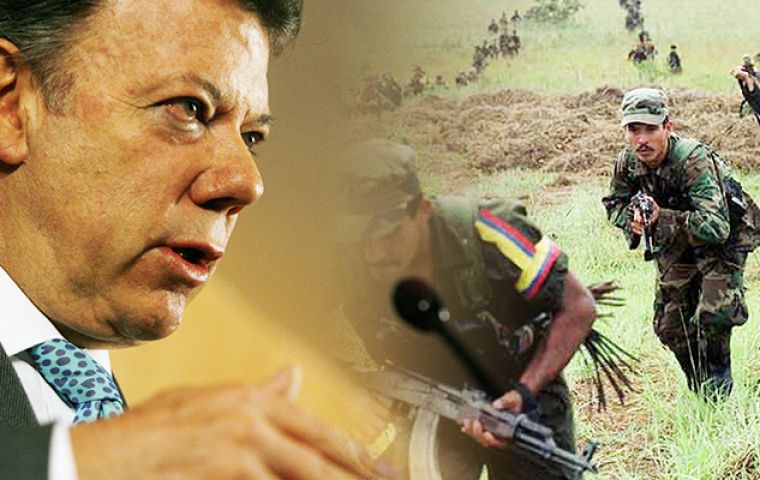MercoPress. South Atlantic News Agency
Santos government rejects FARC truce
 The government of President Juan Manuel Santos cannot accept FARC's truce unless certain conditions are met.
The government of President Juan Manuel Santos cannot accept FARC's truce unless certain conditions are met. Not until a peace deal is achieved will Colombia accept the proposal to bring in other countries, ICRC to monitor ceasefire
Colombia’s government Thursday rejected a unilateral truce offer by FARC, on the grounds that the conditions are unacceptable until a peace deal is reached.
The Revolutionary Armed Forces of Colombia (FARC) had said on Wednesday it would lay down its weapons for an unlimited time to favour peace talks underway in Cuba, which were put on hold after the kidnapping of a Colombian general in November and eventually released earlier this month. FARC also vowed to call off the ceasefire if its units were attacked by Colombia’s US-backed military.
President Juan Manuel Santos' government is said to be mistrustful about agreeing to a bilateral truce out of fear it would give the rebels an opportunity to re-arm. Santos explained he couldn’t accept the rebels’ demand that the truce be verified by several Latin American states and the International Committee of the Red Cross (ICRC), saying this would have to wait until a deal to end hostilities was reached. But he valued the rebels’ gesture as a way to bring the parties closer together in a half-century-old conflict that still claims hundreds of civilian lives every year and is said to be fuelled by the smuggling of cocaine and other criminal activity.
“We have resolved to declare a unilateral ceasefire and end to hostilities for an indefinite time, which should transform into an armistice,” a spokesperson for the FARC said in Havana. But it is unclear where the government’s negative response leaves the ceasefire, which is set to take effect from midnight Saturday. The rebel group has declared temporary ceasefires during the past two Christmases and it halted combat operations during this year’s elections, but has not called an indefinite ceasefire since the current talks began.
The two sides have reached agreements on agrarian reform, political participation for the FARC and how to jointly combat illegal drugs. But some of the thorniest issues remain unresolved, including how the FARC would lay down its arms and whether commanders would face prosecution for atrocities and drug trafficking.
Thousands of Colombians marched over the weekend in major cities to reject any amnesty that would allow rebel leaders to escape justice.




Top Comments
Disclaimer & comment rulesCommenting for this story is now closed.
If you have a Facebook account, become a fan and comment on our Facebook Page!